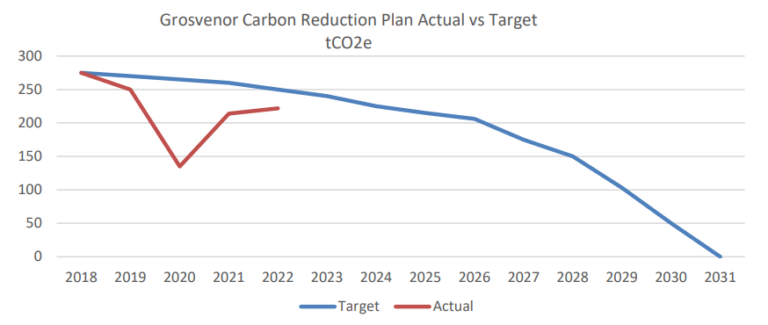Grosvenor Services is committed to achieving Net Zero emissions by 2032
Baseline emissions are a record of the greenhouse gases that have been produced in the past and were produced prior to the introduction of any strategies to reduce emissions. Baseline emissions are the reference point against which emissions reduction can be measured.
Baseline Year: 2018
Additional Details relating to the Baseline Emissions calculations.
Baseline emissions for 2018 include Gas, Oil and fuel for staff vehicles on scope 1. Electricity usage in company owned and leased buildings for scope 2. Only flights were recorded as staff travel as part of scope 3.
All conversions rates were based on Defra Carbon Factor 2015.
Baseline year emissions:
Emissions
Scope 1
Scope 2
Scope 3
Total Emissions
Total (tCO2e)
190.833 (Gas/Oil/Vehicle fuel)
72.343 (electricity usage)
12.41 (staff flights)
275.586
Emissions
Scope 1
Scope 2
Scope 3
Total Emissions
Total (tCO2e)
209.4 (Gas/Oil/Vehicle fuel)
50.3 (renewable sourced energy so not included are total emissions)
11.3 (staff flights/hotels/water/waste)
220.7
We project that carbon emissions will decrease over the next five years to 230.738 tCO2e by 2027.This is a reduction of 20%
In order to continue our progress to achieving Net Zero, we have adopted the following carbon reduction targets.
All new vehicles must meet the following criteria:
When replacing electrical equipment in we will replace with an B rates (Old A+) rated products.
Progress against these targets can be seen in the graph below:

The following environmental management measures and projects have been completed
or implemented since the 2018 baseline. The carbon emission reduction achieved by these schemes equate to 54.886 tCO2e, a 19.92 %age reduction against the 2018
baseline and the measures will be in effect when performing the contract.
In the future we hope to implement further measures such as:
Building energy Efficiency surveys and recommendations for carbon reduction by:
This Carbon Reduction Plan has been completed in accordance with PPN 06/21 and associated guidance and reporting standard for Carbon Reduction Plans.
Emissions have been reported and recorded in accordance with the published reporting standard for Carbon Reduction Plans and the GHG Reporting Protocol corporate standard7 and uses the appropriate Government emission conversion factors for greenhouse gas company reporting8.
Scope 1 and Scope 2 emissions have been reported in accordance with SECR requirements, and the required subset of Scope 3 emissions have been reported in accordance with the published reporting standard for Carbon Reduction Plans and the Corporate Value Chain (Scope 3) Standard9.
This Carbon Reduction Plan has been reviewed and signed off by the Leadership team.

Director of CSR and Safety
Date Signed: 17/07/2023
All Rights Reserved Grosvenor Services Group, 2024